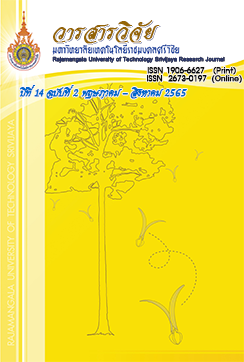CO2 Mitigation by Algae
Keywords:
algae, CO2 mitigation, greenhouse gasAbstract
The increasing of atmospheric carbon dioxide (CO2), one of the greenhouse gases, is a global critical environmental issue. The objective of this research was to study the efficiency of CO2 reduction using 3 algae strains (Chlorella sp., Spirulina sp. and Scenedesmus sp.). The three strains were cultivated in 5liter photobioreactor under the light intensity of 4,000 lux. They were continuously sparged with CO2 (99%) at a flow rate of 0.05 vvm for 20 days. The results found that Chlorella sp. expressed the highest efficiency with the maximum specific growth rate, cell density (OD560), biomass productivity, efficiency of CO2 reduction and CO2 fixation rate of 0.43±0.05 d-1, 0.62±0.02, 2,166.70±57.70 mg.l-1., 97.33±0.58%, and 4,073.30±108.50 mg.l-1.d-1 , respectively. The average CO2 sequestration obtained in 20 days was 3.88±0.01 mole. In addition, the efficiency of CO2 reduction and CO2 sequestration were significantly different (p<0.05).
References
Ahn, J.W., Hwangbo, K., Lee, S.Y., Choi, H.G., Park, Y.l., Liu, J.R. and Jeong, W.J. 2012. Shorth communication anew arctic Chlorella species for biodiesel production. Bioresource Technology 125: 340-343.
Barsanti, L. and Gualtieri, P. 2014. Algae Anatomy, Biochemistry, and Biotechnology. 2nd ed. Taylor & Francis Group, NewYork.
Chan, A. 2011. Use of microalgae in wastewater treatment to remove contaminants and purify biogas. Master of Applied Science, The University of Guelph, Canada.
Chidthaisong, A. 2010. Thailand Climate Change Information. The Thailand Research Fund’s Research development and Co-ordination Center for Global Warming and Climate Change, Bangkok. (in Thai)
Chiu, S.Y., Kao, C.Y., Huang, T.T., Lin, C.J., Ong, S.C., Chen, C.D., Chang, J.S. and Lin, C.S. 2011. Microalgal biomass production and on-site bioremediation of carbon dioxide, nitrogen oxide and sulphur dioxide from flue gas using Chlorella sp. cultures. Bioresource Technology 102: 9135-9142.
Ho, S.H., Chen, C.Y., Lee, D.J. and Chang, J.S. 2011. Research review paper: Perspectives on microalgle CO2-emission mitigation systems - A review. Biotechnology Advances 29: 189-198.
Kao, C.Y., Chiu, S.Y., Huang, T.T., Dai, L., Hsu, L.K. and Lin, C.S. 2012a. Ability of a mutant strain of microalgae Chlorella sp. to capture carbon dioxide capture for biogas upgrading. Applied Energy 39: 76-183.
Kao, C.Y., Chiu, S.Y., Huang, T.T., Dai, L., Wang, G.H, Tseng, C.P., Chen, C.H. and Lin, C.S. 2012b. A mutant strain of microalgae Chlorella sp. for the carbon dioxide capture from biogas. Biomass and Bioenergy 36: 32-140.
Kargupta, W., Ganesh, A. and Mukherji, S. 2015. Estimation of carbon dioxide sequestration Potential of microalgae grown in a batch photobioreactor: Short Communication. Bioresource Technology 180: 370-375.
Lane, A.E. and Burris, J.E. 1981. Effects of environmental pH on the internal pH of Chlorella pyrenoidosa, Scenedesmus quadricauda and Euglena mutablis. Plant Physiol 68: 439-442.
Li, F.F., Yang, Z., Zeng, R., Yang, G., Chang, X., Yan, J.B. and Hou, Y.L. 2011. Microalgae capture of CO2 from actual flue gas discharged from a combustion chamber. Industrial & Engineering Chemistry Research 50(10): 6496-6502.
Man, K.L. and Keat, T.L. 2013. Effect of carbon source towards the growth of chlorella vulgaris for CO2 bio-mitigation and biodiesel production. International Journal of Greenhouse Gas Control 14: 169-176.
Mann, G., Schlegel, M., Schumann, R. and Sakalauskas, A. 2009. Biogas-condition with microalgae. Agronomy Research 7(1): 33-38.
Morais, M.G.D. and Costa, J.A.V. 2007. Carbon dioxide fixation by Chlorella kessleri, Chlorella vulguris, Scenedesmus obliquus and Spirulina sp. cultivated in flasks and vertical tubular photobioreactors. Biotechnol Lett 29: 1349-1352.
Ngoenkhamkhong, K., Cheunbarn, S., Cheunbaen, T. and Ngoenkhamkhong, N. 2017. The Efficiency of CO2 Capture by Green Microalgae. RMUTI Journal 10(2): 119-129. (in Thai)
Oliveira, M.A.C., Monteiro, L.D., Robb, P.G. and Leite, S.G.F. 1999. Growth and Chemical composition of Spirulina maxima and Spirulina patensis biomass at different temperature. Aquaculture International 7: 261-275.
Ren, H.Y., Liu, B.F., Ma, C., Zhao, L. and Ren, N.Q. 2013. A new lipid-rich microalga Scenedesmus sp. strain R-16 isolated using Nile red staining: effects of Carbon and nitrogen sources and initial pH on the biomass and lipid production. Biotechnology for biofuels 6(143): 1-10.
Serejo, M.L., Olmos, E.P., Boncz, M., Blanco, S., Garcia-Encina, P.A. and Munoz, R. 2015. Influence of biogas flow rate on biomass composition during the optimization of biogas upgrading in microalgal-bacterial process. Environmental Science & Technology 49(5): 1-16.
Shuler, M.L., Kargi, F. and De Lisa, M. 1922. Bioprocess engineering: basic concept. 3rd ed. Prentical Hall, Englewood Cliffis New Jersey, United State.
Srethasirot, B., Chidthaisong, A. and Chinwanno, S. 2014. Climate@risk. Bangkok Business Publishing, Bangkok. (in Thai)
Sumardiono, S., Yono, B., Syaichurrozi, I. and Sasongko, S.B. 2014. Utilization of biogas as carbon dioxide provider for Spirulina platensis culture. Biological Sciences 6(1): 53-59.
Toledo-Cervantes, A., Morales, M., Novelo, E. and Revah, S. 2013. Carbon dioxide fixation and lipid storage by Scenedesmus obtusiusculus. Bioresource Technology 130: 652-658.
Tongprawhan, W., Srinuanpa, S. and Cheirsilp, B. 2014. Biocapture of CO2 from biogas by Oleaginous microalgae for improving methane content and simultaneously producing lipid. Bioresource Technology 170: 90-99.
Zeng, X., Danquah, M.K., Zhang, S., Zhang, X., Wu, M., Chen, X.D., Ng, I.S., Jing, K. and Lu, Y. 2012. Autotrophic cultivation of Spirulina platensis for CO2 fixation and phycocyanin production. Chemical Engineering 183: 192-197.
Downloads
Published
How to Cite
Issue
Section
License
Copyright (c) 2022 Rajamangala University of Technology Srivijaya Research Journal

This work is licensed under a Creative Commons Attribution-NonCommercial-NoDerivatives 4.0 International License.
The content and information in the article published in Journal of Rajamangala University of Technology Srivijaya It is the opinion and responsibility of the author of the article. The editorial journals do not need to agree. Or share any responsibility.







